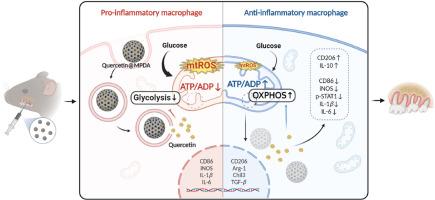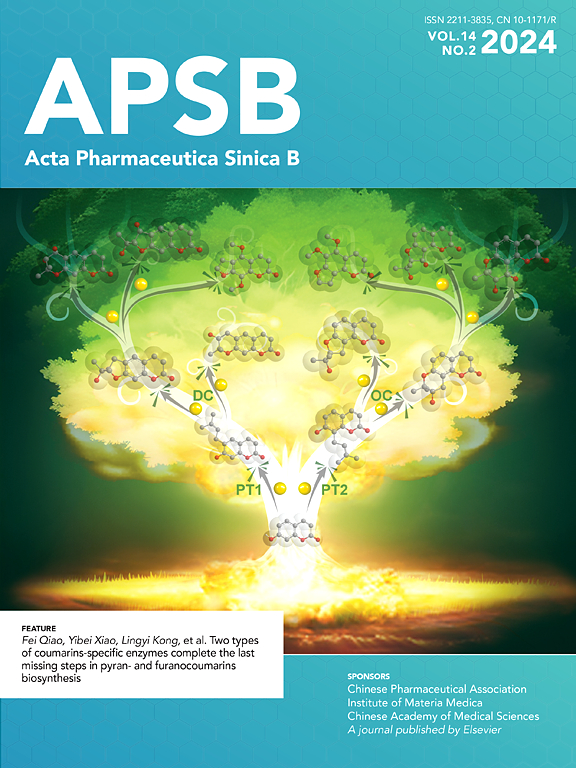通过纳米槲皮素介导的糖酵解和 OXPHOS杠杆作用,重构巨噬细胞的免疫代谢线路,从而治疗牙周炎
IF 14.7
1区 医学
Q1 PHARMACOLOGY & PHARMACY
引用次数: 0
摘要
牙周炎是一种以免疫微环境失调为特征的慢性炎症性疾病,给有效治疗带来了巨大挑战。这种疾病的特征是巨噬细胞中葡萄糖代谢的改变,特别是有氧糖酵解的增加,这与炎症反应的加剧有关。这表明,针对巨噬细胞的新陈代谢可提供一种新的治疗途径。在这项研究中,我们开发了一种免疫代谢干预方法,使用包裹在生物粘性介孔多巴胺(Q@MPDA)中的槲皮素(Q)来治疗牙周炎。我们的研究结果表明,Q@MPDA 可将炎性巨噬细胞重新编程为抗炎表型(从 M1 到 M2 的复极化)。在小鼠牙周炎模型中,局部给药 Q@MPDA 可减少炎性巨噬细胞的存在,并降低牙周炎症细胞因子(IL-1 和 TNF-)和活性氧(ROS)的水平。因此,它能缓解牙周炎症状,减少牙槽骨流失,促进组织修复。此外,我们的研究还发现,Q@MPDA 可抑制炎性巨噬细胞的糖酵解,同时增强氧化磷酸化(OXPHOS),促进巨噬细胞从 M1 亚型向 M2 亚型转变。我们的研究结果表明,Q@MPDA 是一种治疗牙周炎免疫代谢重构的有效方法。本文章由计算机程序翻译,如有差异,请以英文原文为准。

Immunometabolic rewiring in macrophages for periodontitis treatment via nanoquercetin-mediated leverage of glycolysis and OXPHOS
Periodontitis is a chronic inflammatory disease marked by a dysregulated immune microenvironment, posing formidable challenges for effective treatment. The disease is characterized by an altered glucose metabolism in macrophages, specifically an increase in aerobic glycolysis, which is linked to heightened inflammatory responses. This suggests that targeting macrophage metabolism could offer a new therapeutic avenue. In this study, we developed an immunometabolic intervention using quercetin (Q) encapsulated in bioadhesive mesoporous polydopamine (Q@MPDA) to treat periodontitis. Our results demonstrated that Q@MPDA could reprogram inflammatory macrophages to an anti-inflammatory phenotype (i.e., from-M1-to-M2 repolarization). In a murine periodontitis model, locally administered Q@MPDA reduced the presence of inflammatory macrophages, and decreased the levels of inflammatory cytokines (IL-1β and TNF-α) and reactive oxygen species (ROS) in the periodontium. Consequently, it alleviated periodontitis symptoms, reduced alveolar bone loss, and promoted tissue repair. Furthermore, our study revealed that Q@MPDA could inhibit the glycolysis of inflammatory macrophages while enhancing oxidative phosphorylation (OXPHOS), facilitating the shift from M1 to M2 macrophage subtype. Our findings suggest that Q@MPDA is a promising treatment for periodontitis via immunometabolic rewiring.
求助全文
通过发布文献求助,成功后即可免费获取论文全文。
去求助
来源期刊

Acta Pharmaceutica Sinica. B
Pharmacology, Toxicology and Pharmaceutics-General Pharmacology, Toxicology and Pharmaceutics
CiteScore
22.40
自引率
5.50%
发文量
1051
审稿时长
19 weeks
期刊介绍:
The Journal of the Institute of Materia Medica, Chinese Academy of Medical Sciences, and the Chinese Pharmaceutical Association oversees the peer review process for Acta Pharmaceutica Sinica. B (APSB).
Published monthly in English, APSB is dedicated to disseminating significant original research articles, rapid communications, and high-quality reviews that highlight recent advances across various pharmaceutical sciences domains. These encompass pharmacology, pharmaceutics, medicinal chemistry, natural products, pharmacognosy, pharmaceutical analysis, and pharmacokinetics.
A part of the Acta Pharmaceutica Sinica series, established in 1953 and indexed in prominent databases like Chemical Abstracts, Index Medicus, SciFinder Scholar, Biological Abstracts, International Pharmaceutical Abstracts, Cambridge Scientific Abstracts, and Current Bibliography on Science and Technology, APSB is sponsored by the Institute of Materia Medica, Chinese Academy of Medical Sciences, and the Chinese Pharmaceutical Association. Its production and hosting are facilitated by Elsevier B.V. This collaborative effort ensures APSB's commitment to delivering valuable contributions to the pharmaceutical sciences community.
 求助内容:
求助内容: 应助结果提醒方式:
应助结果提醒方式:


